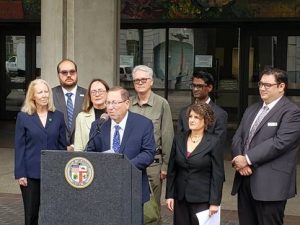It’s a busy time for air quality – the California Legislature is in the middle of its legislative cycle; agencies are developing spending plans and regulations and local governments are considering ordinances and other actions that will affect our air. Given all this commotion, air quality advocates must be engaged at all levels of government. Here’s a quick look at some of our work over the past six months, and what we can expect on the road ahead:
Heavy-Duty Trucks
SB 210 (Leyva): Did you know heavy-duty trucks (think big rigs) are exempt from smog checks? California law requires cars and other “light-duty” vehicles over eight years old to be smogged every other year. However, heavy-duty vehicles aren’t subject to a comprehensive inspection and maintenance program.
California’s smog check program (which CCA helped create in the 1980s) is a useful tool in reducing pollution and ensuring cars are mechanically sound. Diesel particulate matter – the sooty, black exhaust from diesel trucks, is a known carcinogen and is concentrated in low-income communities and communities of color.
We are working with Senator Connie Leyva of the Inland Empire and a broad coalition of health and environmental advocates to create a new heavy-duty smog check program. The bill passed the Senate, 27-10 and is currently heading to the Assembly Transportation Committee. We need all the help we can get – if your Assemblymember serves on the committee (membership can be found here), please let them know you support SB 210!
The San Francisco Chronicle has endorsed the measure, quoting CCA Policy Director Bill Magavern saying SB 210 is “the most important air quality bill of the year.”
State Budget
It’s often said that “budgets are moral documents”, as they represent the values and priorities of the government. California’s climate investments are no different. Thanks to the work of CCA and many other advocates, the California Air Resources Board (CARB) spends 57% of its cap-and-trade revenues on investments that benefit or are within disadvantaged and low-income communities.
The 2019-20 budget includes $730 million in Greenhouse Gas Reduction funds for clean transportation and other air quality incentives. While this budget will support important vehicle incentives, more funds are needed to replace our dirty cars, trucks and buses with clean alternatives. A study from the University of Toronto found 25% of vehicles – those that are older and poorly maintained, are responsible for 90% of vehicular pollution.
In addition to our advocacy at the State Legislature, we’ve been working with CARB on their annual funding plan for clean transportation incentives. CCA staff has participated in multiple public workshops, staff calls and drafted a Charge Ahead California comment letter to the CARB Board. One of the big focuses of our efforts has been to ensure the continued effectiveness and stability of California’s Clean Vehicle Rebate Project, which is running out of funding due to high demand for electric vehicles. We are urging CARB to prioritize low-to-moderate income earners and affordable, long-ranged cars over luxury models and low-electric mileage vehicles.
Clean Cars
As you may have heard, the Trump Administration is proposing to freeze Federal fuel efficiency standards and revoke California’s decades-long authority to regulate emissions from cars. CCA has been engaged with the efforts to protect our clean car standards since the rollback was announced. We are currently supporting Representative Doris Matsui’s HR 978, which would codify the cleaner car standards into statute. Additionally, we’re supporting Representative Mike Levin’s HR 2746, which would create the first national zero emissions vehicles standard and mandate that all cars sold in 2040 would need to be electric.
In addition to fighting for EV-friendly policy at the State and Federal level, CCA has also been working to electrify transportation locally. San Francisco and Los Angeles are both considering creating a fee on services like Lyft and Uber. We see this as a great opportunity to promote transportation electrification. As such, we’ve been advocating for both San Francisco and Los Angeles to create a fee structure which encourages drivers and customers to use electric vehicles and electrified shared rides.
Local ordinances and community air protection
Last but certainly not least, we’re also working to promote clean air at the local level. Los Angeles County is in the final stages of drafting its first-ever sustainability plan. Throughout 2018 and 2019, CCA has participated in the drafting process by participating in workshops and submitting a comment letter. CCA has also been working with local advocates and Los Angeles City Councilmember Paul Koretz to create an anti-idling ordinance for Los Angeles. And recently, the South Coast Air Quality Management District increased toxic polluter fees on an expedited timeline, thanks to pressure from CCA and other environmental and community advocates.
However, most of our local work has focused on the implementation process of the previously mentioned AB 617. AB 617 requires the California Air Resources Board and local air districts to identify the communities suffering the worst cumulative impacts from air pollution. Once these communities have been identified the local air districts are required to create localized Community Emissions Reduction Plans through a community steering committee process. CCA staff has been actively engaged with the South Coast Air Quality Management District’s implementation of AB 617. CCA staff regularly attends and participates in AB 617 communities in Los Angeles’s Port Communities, San Bernardino and East Los Angeles. We also work with environmental justice advocates both in these first three communities and future AB 617 areas to ensure these communities get to enjoy clean air.
As you can see, we’ve got quite a bit on our plate! And this only covers a fraction of all the work we do. Please keep an eye out for future action alerts and news; and if you really like our work, please consider supporting us too!








